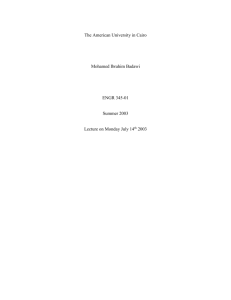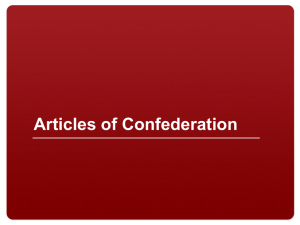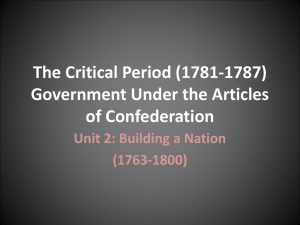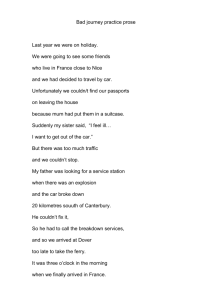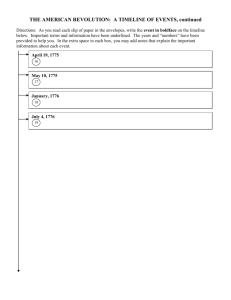Articles of Confederation effective and ineffective chart
advertisement
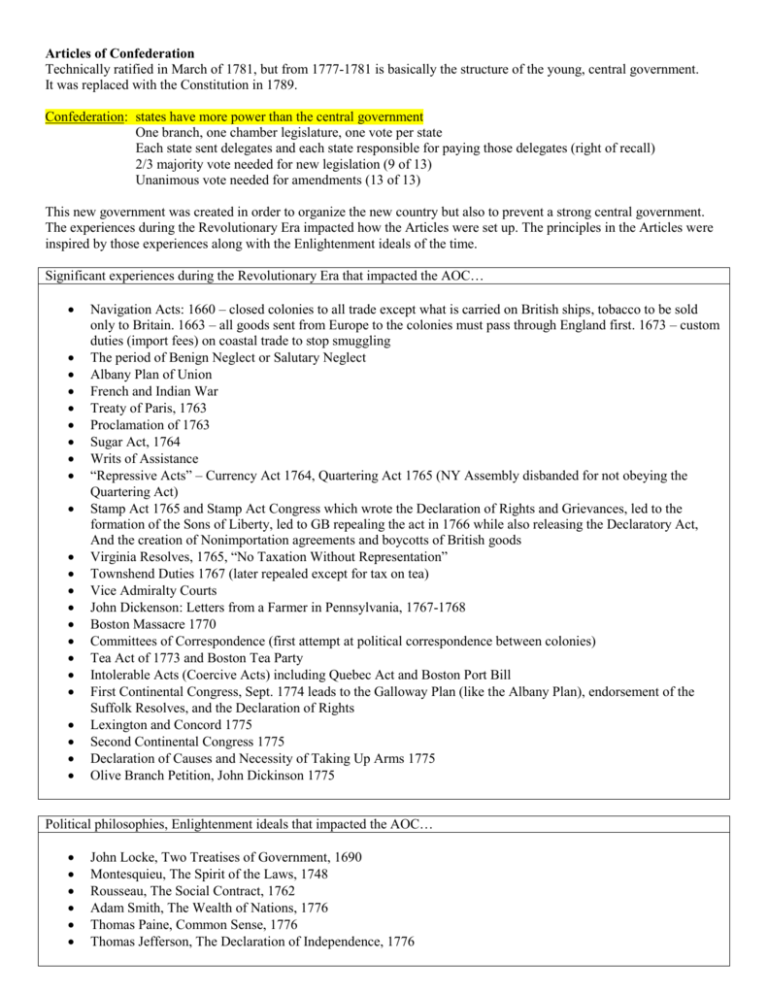
Articles of Confederation Technically ratified in March of 1781, but from 1777-1781 is basically the structure of the young, central government. It was replaced with the Constitution in 1789. Confederation: states have more power than the central government One branch, one chamber legislature, one vote per state Each state sent delegates and each state responsible for paying those delegates (right of recall) 2/3 majority vote needed for new legislation (9 of 13) Unanimous vote needed for amendments (13 of 13) This new government was created in order to organize the new country but also to prevent a strong central government. The experiences during the Revolutionary Era impacted how the Articles were set up. The principles in the Articles were inspired by those experiences along with the Enlightenment ideals of the time. Significant experiences during the Revolutionary Era that impacted the AOC… Navigation Acts: 1660 – closed colonies to all trade except what is carried on British ships, tobacco to be sold only to Britain. 1663 – all goods sent from Europe to the colonies must pass through England first. 1673 – custom duties (import fees) on coastal trade to stop smuggling The period of Benign Neglect or Salutary Neglect Albany Plan of Union French and Indian War Treaty of Paris, 1763 Proclamation of 1763 Sugar Act, 1764 Writs of Assistance “Repressive Acts” – Currency Act 1764, Quartering Act 1765 (NY Assembly disbanded for not obeying the Quartering Act) Stamp Act 1765 and Stamp Act Congress which wrote the Declaration of Rights and Grievances, led to the formation of the Sons of Liberty, led to GB repealing the act in 1766 while also releasing the Declaratory Act, And the creation of Nonimportation agreements and boycotts of British goods Virginia Resolves, 1765, “No Taxation Without Representation” Townshend Duties 1767 (later repealed except for tax on tea) Vice Admiralty Courts John Dickenson: Letters from a Farmer in Pennsylvania, 1767-1768 Boston Massacre 1770 Committees of Correspondence (first attempt at political correspondence between colonies) Tea Act of 1773 and Boston Tea Party Intolerable Acts (Coercive Acts) including Quebec Act and Boston Port Bill First Continental Congress, Sept. 1774 leads to the Galloway Plan (like the Albany Plan), endorsement of the Suffolk Resolves, and the Declaration of Rights Lexington and Concord 1775 Second Continental Congress 1775 Declaration of Causes and Necessity of Taking Up Arms 1775 Olive Branch Petition, John Dickinson 1775 Political philosophies, Enlightenment ideals that impacted the AOC… John Locke, Two Treatises of Government, 1690 Montesquieu, The Spirit of the Laws, 1748 Rousseau, The Social Contract, 1762 Adam Smith, The Wealth of Nations, 1776 Thomas Paine, Common Sense, 1776 Thomas Jefferson, The Declaration of Independence, 1776 They were effective because… They were ineffective because… AOC GAVE CENTRAL POWER TO… -MAKE WAR AND PEACE -SIGN TREATIES OF ALLIANCE -ESTABLISH AMOUNTS (MEN AND MONEY) STATES SHOULD PROVIDE FOR NATIONAL PURPOSES - SETTLE DISPUTES BETWEEN STATES -ESTABLISH A POSTAL SERVICE - DEAL WITH NATIVE AMERICANS -APPOINT MILITARY OFFICERS FOR ARMED FORCES AOC DID NOT PROVIDE POWER TO… -LEVY TAXES -RAISE TROOPS -REGULATE COMMERCE Honored states rights Honored desire for weak central government Persuaded states to give up their land claims west of the Appalachians, which became an important source of revenue and new states Attempted to deal with foreign and domestic debt, which were approximately $41.2 million domestically and $7.9 million internationally. They lowered the domestic debt from 41.2 to 6. International/Foreign debt increased from 7.9 to 10.2. Land Ordinance of 1785 provided for sale of public lands in the new western territory… surveying land…and providing for public education ($1 per acre with a 640 acre minimum; about $760,000 received during the Confederation period. Towns laid out like New England towns had been – legacy of Puritans – with 640 acre sections… each with one set aside for schools) Northwest Ordinance of 1787 established territorial procedures for the admission of the five states as equal and prohibited slavery in that territory Led the young nation in a war… which they won Negotiated the Treaty of Paris, 1783 Negotiated mutual defense treaty with France. Negotiated commercial treaties with France, Sweden, Holland, Prussia, and Morocco Borrowed money from Holland Established a bureaucracy that continued after 1789 and ws incorporated into the new government under the Constitution, namely Departments of War, Finance, and Foreign Affairs Established the Post Office, which continued past 1789 Authorized the Constitutional Convention in 1787 and proposed a better form of government (even though the AOC said ratification must be unanimous… only 9 being necessary for ratifying new Constitution was violating Article 13) Decentralized government with limited sovereignty, only a league of friendship and therefore limited Most actions by Congress required 9 votes and amendments required unanimous vote; hard to make changes or take action No provision for raising money through duties or taxes unless all states agreed… twice a vote was taken… twice it failed Only a fraction of state tax money requested was actually collected Without an Executive branch, there was no clear/strong leadership Tariff conflicts among states were unresolved… no control of interstate trade/commerce Couldn’t stop states from printing too much paper money & the central currency printed during the was (Continentals) were nearly worthless (PA, SC, NY handled their money issue pretty well… RI, GA, NC, NJ didn’t) Couldn’t raise an army, couldn’t raise a navy, couldn’t call the militia… leading to lack of protection in NW Territory and no ability to respond to Shays Rebellion No Judicial Branch Although they did negotiate some treaties they failed to establish a strong, effective diplomatic presence in international affairs Jay-Gardoqui Treaty accepted Spain’s closure of the lower Mississippi to American ships in exchange for a commercial treaty favorable to New England, which created conflict between South & West against NE Unable to get GB to reopen trade yet GB flooded US markets with goods… hurting economy, creating trade deficit… GB not buying tobacco, indigo, rice… Didn’t pass navigation laws to limit incoming ships (mainly GB) Couldn’t get resolution with GB regarding Loyalists, debts owed, loss of slaves (50,000 slaves left with the British), border disputes (GB encouraging Indians to attack Americans… western areas and especially Georgia very susceptible) No provision for admitting new states except for Canada and other British colonies No real nationalism until Constitutional Convention
